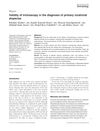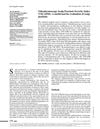Dermoscopic Features of Lichen Planopilaris in Northern Iran: A Prospective Observational Study
August 2019
in “
International Journal of Dermatology
”

TLDR Dermoscopy is useful for diagnosing lichen planopilaris and certain features may relate to disease duration, age, and gender.
In 2019, a prospective observational study was conducted on 81 patients with cicatricial alopecic patches on their scalps to assess the usefulness of dermoscopy in diagnosing lichen planopilaris (LPP). The study found that dermoscopy was a helpful diagnostic tool in differentiating LPP among patients with primary cicatricial alopecia (PCA). The analysis of 44 patients with a definite diagnosis of LPP showed that over 77% of patients had at least one form of follicular opening disorder and about 75% had shaft disorders. The most common pattern of pigmentation was milky-red (97.73%). Patients with coiled and twisted hairs, small yellow dots, large yellow dots, and peripilar sign were more likely to have a shorter disease duration. Those with overall shaft disorders were younger. Small yellow dots and peripilar sign were more common in female patients. The study recommended larger cohort studies to determine the role of demographic factors in predicting the dermoscopic patterns among LPP patients.










